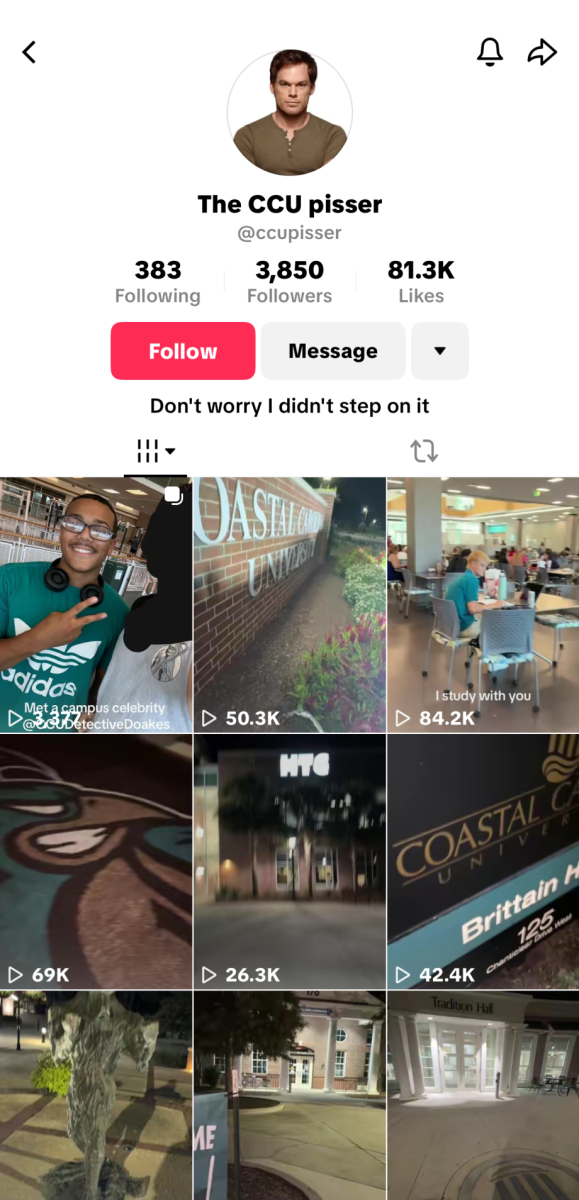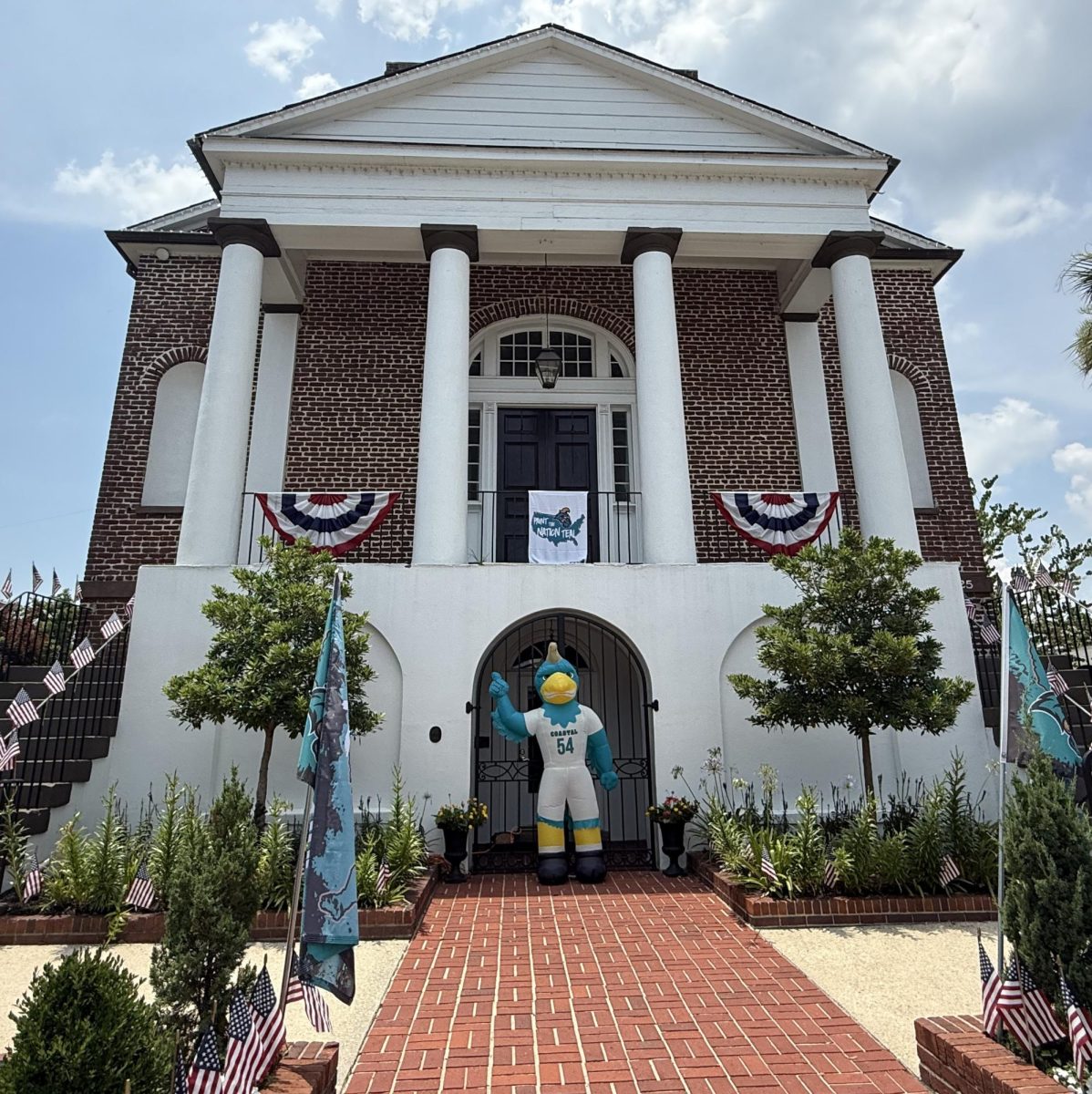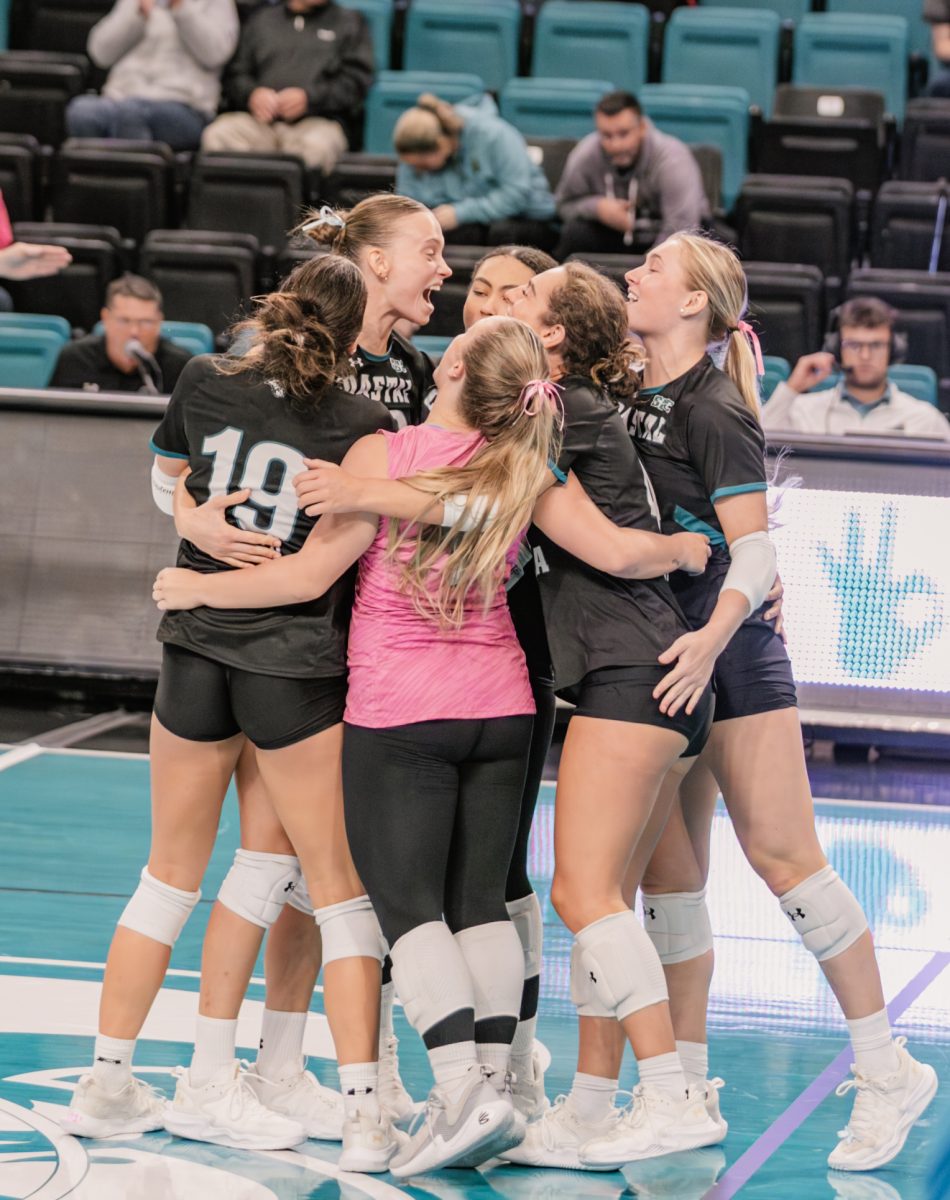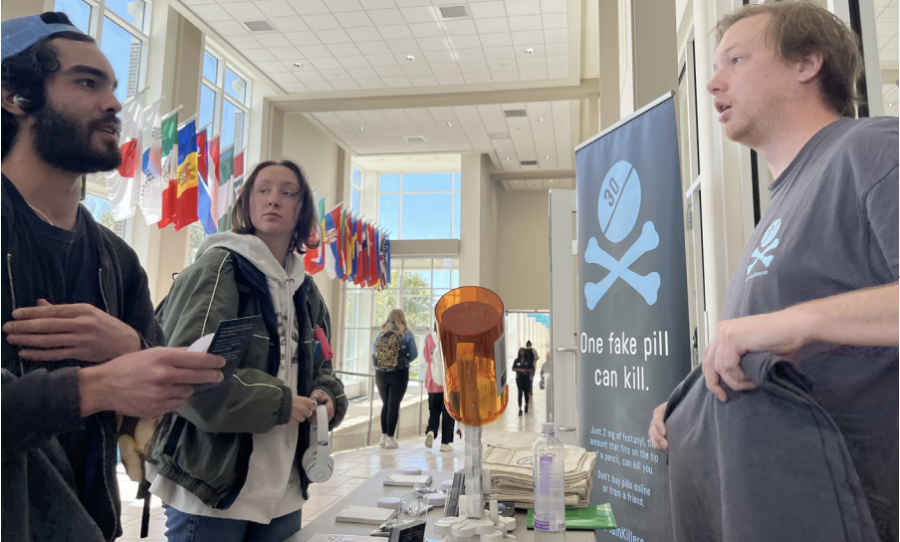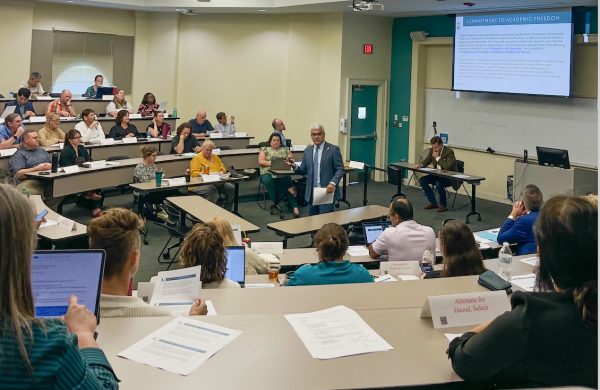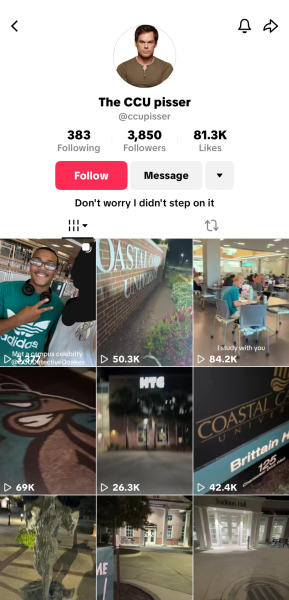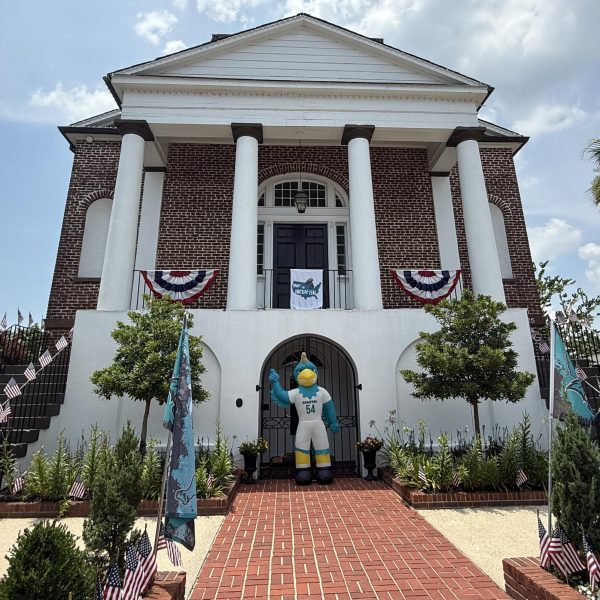“One fake pill can kill”
Fighting against opioid epidemic starts with college students
Senior Will Lopez and sophomore Meghan Chambers visit the Just Plain Killers tabling event with Field Marketing Coordinator Carson Rhyne to learn more about the initiative.
A counterfeit opioid pill containing only 2 mg of fentanyl can be a deadly dose, according to Carson Rhyne, field marketing coordinator for Just Plain Killers.
Just Plain Killers is a South Carolina Department of Alcohol and Other Drug Abuse Services (DAODAS) initiative to fight the opioid epidemic by spreading awareness of fentanyl-laced pills. Data suggests opioid addiction and fentanyl-laced pills have increased steadily in recent years, Rhyne said.
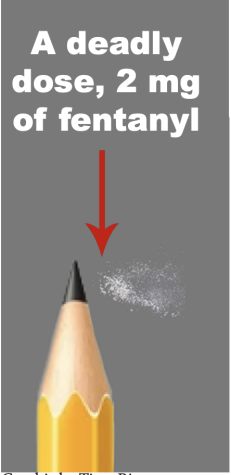
In Horry County alone, the total drug overdose deaths rose 38.1% from 197 in 2020 to 272 deaths in 2021, as reported by the South Carolina Department of Health and Environmental Control in 2021. The department’s data also showed fentanyl was the third most-reported drug in overdoses in the same year, following behind opioids and prescription drugs.
“Addiction can happen to anybody,” Rhyne said.
Just Plain Killers focuses on educating young adults ages 18 to 24, he said, because college students are a common target for these counterfeit pills. Rhyne said college life often encourages partying, and parties are common places for the fake painkillers.
The South Carolina Department of Health and Environmental Control reported opioid-involved overdose deaths in in 18 to 24-year-olds increased from 61 deaths in 2017 to 130 in 2021.
Graduate assistant for the LiveWell Office Nicholas Main said universities that allow initiatives like Just Plain Killers to hand out naloxone, an opioid-overdose antidote, can face judgement because it may suggest there is a drug issue at the institution.
One of the most common brands of naloxone is Narcan, a drug that delivers the antidote in the form of a nasal spray. Just Plain Killers will tentatively hand out Narcan on campus April 14.
Main said there is excessive binge drinking and substance abuse at Coastal Carolina University, but it is not a defining aspect of the campus.
“I think it happens at all colleges,” Main said. “It’s part of college culture.”
To educate college-aged audiences, DAODAS has set up tabling events here on campus along with others including Horry-Georgetown Technical College, Clemson University, Furman College, Lander University, Charleston Southern University, and some University of South Carolina branches.
Associate Director of LiveWell Chris Donevant-Haines said counterfeit drugs look exactly like prescription medication, and it is hard to tell the difference between a real and a fake pill. She said there is almost no difference in size, color or taste.
“I think the way to discern a fake from a real is to only accept medication from a doctor or certified medical professional,” Donevant-Haines said. “You can put a pill in front of anybody. There are counterfeit drugs out there that visibly look just like a prescription medication.”
She said by the time someone can figure out if the drug was laced, it is usually too late. To combat this issue, doctors have begun to provide a description of the medications they prescribe.
Similarly, Rhyne said friends may be trustworthy, but the drugs are not.
“It can be a long chain of hands switching back and forth,” Rhyne said. “During that exchange, somebody could’ve added a little bit of fentanyl or something. You never know how dangerous one fake pill can be.”
Rhyne said tabling events at CCU have been the most successful because students seem engaged and interested in the topic. Rhyne set up a tabling event on March 15 in the Lib Jackson Student Union rotunda, and handed out items like t-shirts, stickers, tote bags for people to spread the message, “one fake pill can kill.”
Senior psychology major Will Lopez said he believes Just Plain Killers’ movement of spreading fentanyl awareness is important because it affects more drugs than just painkillers.
“When I first saw the table down the hall in Lib, I knew I had to go up there,” Lopez said. “I just thought it was very important to spread the awareness by noticing how many people were ignoring the table going by.”
However, when the initiative reached out to other universities for tabling, they received some pushback. Main believes there is a stigma attached to substance abuse and spreading awareness, and the stigma extends to individuals recovering from addiction. Regardless, Rhyne said the main goal is to save a life.
“I say students should care, I think everyone should have Narcan,” Rhyne said. “It still wouldn’t hurt to have some on you.”
Some signs to look for of a suspected overdose, Rhyne said, is if the individual has visible blue skin, has staggered breathing, or is not breathing.
The first step, he said, is to call 911 immediately. In the meantime, it is important to squirt the Narcan into either nostril as the medication will reverse the effects of overdose, and they will wake up with a “burst of energy.” If they slip back into the overdose, administer another spray into the other nostril.
Rhyne said it is important for students to understand Narcan will not hurt someone if they are not actually experiencing an overdose. The antidote is Food and Drug Administration-app
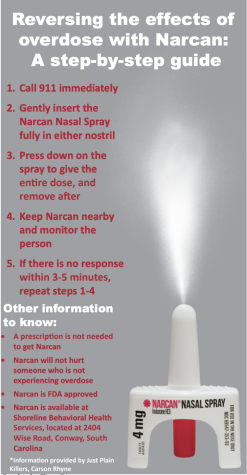
roved and is available without a prescription.
Main said many students, including himself when he was an undergraduate, are not aware of the services LiveWell provides for students. One of their programs, Chants for Recovery, fights the stigma of addiction. Students who struggle with substance abuse commonly do not know where to start, he said, or are afraid to speak up.
“This is where students can come in if they’re seeking a judgment free area where they can talk about what they have going on and how we can best serve them regarding their situation,” Main said.
Students may also receive resources from Shoreline Behavioral Health Services, located at 2404 Wise Road, Conway, South Carolina. They provide counseling services, free testing strips for fentanyl, and Narcan.
As a student, Lopez said he advises his peers to avoid any drug at all costs or at least test it first to see if it can potentially be deadly.
“I don’t think students are going to open their eyes until it happens to one of their fellow students,” Lopez said.
He is also an aspiring bass player who looked up to Tim Feerick, the lead bassist for the musical group Dance Gavin Dance. After traveling from New York to New Jersey to see the band live, they became acquainted in 2015 and Lopez was soon a familiar face in the crowd to Feerick.
Lopez said he went through a roller coaster of emotions when he saw headlines announcing Feerick’s death on April 13, 2022, due to a suspected fentanyl overdose.
“Aside from all the sadness, I was angry because whoever handed him the recreational stuff, I feel like, knew,” he said. “I feel like not any sane person can just give a laced pill to an average person.”
Lopez said he applies what he learned with his loss to being a member in his fraternity today. He has suggested to other members to carry Narcan in all houses in case something happens during a party. Lopez calls on Coastal to bring more awareness to the spread of counterfeit pills as the University does for alcohol.
“I call it the black market because it is,” Lopez said, referring to the use of unprescribed drugs. “You can’t see through pitch blackness, right? So, you don’t know what you’re getting.”

Hey! This semester, I'm the managing editor/content for The Chanticleer. This means I oversee all published material on our website, bi-weekly print editions...

